
Transitions Online_Around the Bloc-Arrests Hit Croatia’s Biggest Company
Spiraling scandal at debt-ridden Agrokor could have a ripple effect across the Balkans.
More...We kindly inform you that, as long as the subject affiliation of our 300.000+ articles is in progress, you might get unsufficient or no results on your third level or second level search. In this case, please broaden your search criteria.

Spiraling scandal at debt-ridden Agrokor could have a ripple effect across the Balkans.
More...
Coalition criticized by domestic opposition and EU for going slow on rampant corruption.
More...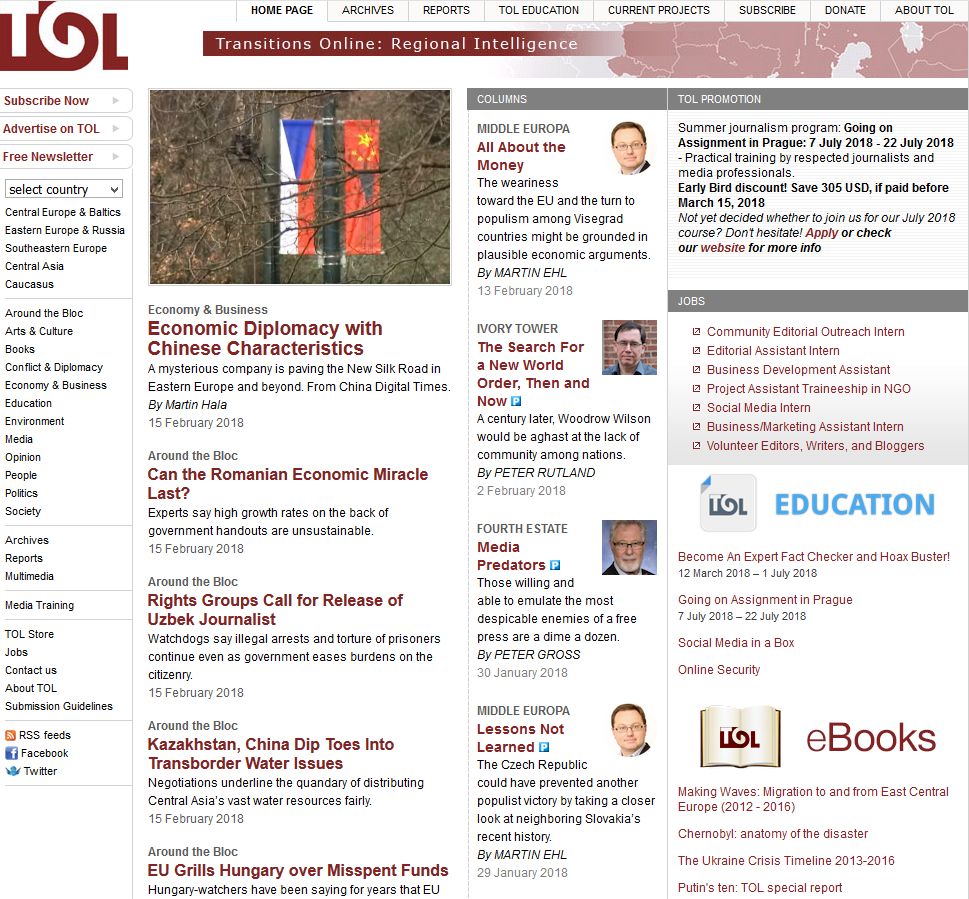
Latest arrests seem to be part of a purge of the notoriously anarchic republic’s top brass.
More...
Navalny in trouble with Russian government and Google over video supposedly capturing a hush-hush meeting on a yacht.
More...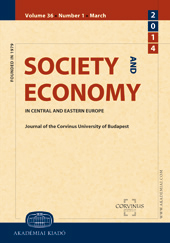
This paper examines the different views, approaches and models of economic competitiveness and its key drivers. It also explores additional factors, especially the so-called intangible ones, influencing competitiveness, and argues for these being increasingly important in the longer run. The paper builds on the results of the most widely accepted competitiveness studies, among them the yearbook of the Institute for Management Development, and also various EU documents. Hungary is used as a case to illustrate the author’s conclusions and suggestions. The most important argument is that competitiveness cannot be measured purely on the basis of short-term economic factors. Reliable results can only be achieved if one thinks more comprehensively about competitiveness, which means using not only economic, but also societal factors, among them intangible ones to measure competitiveness.
More...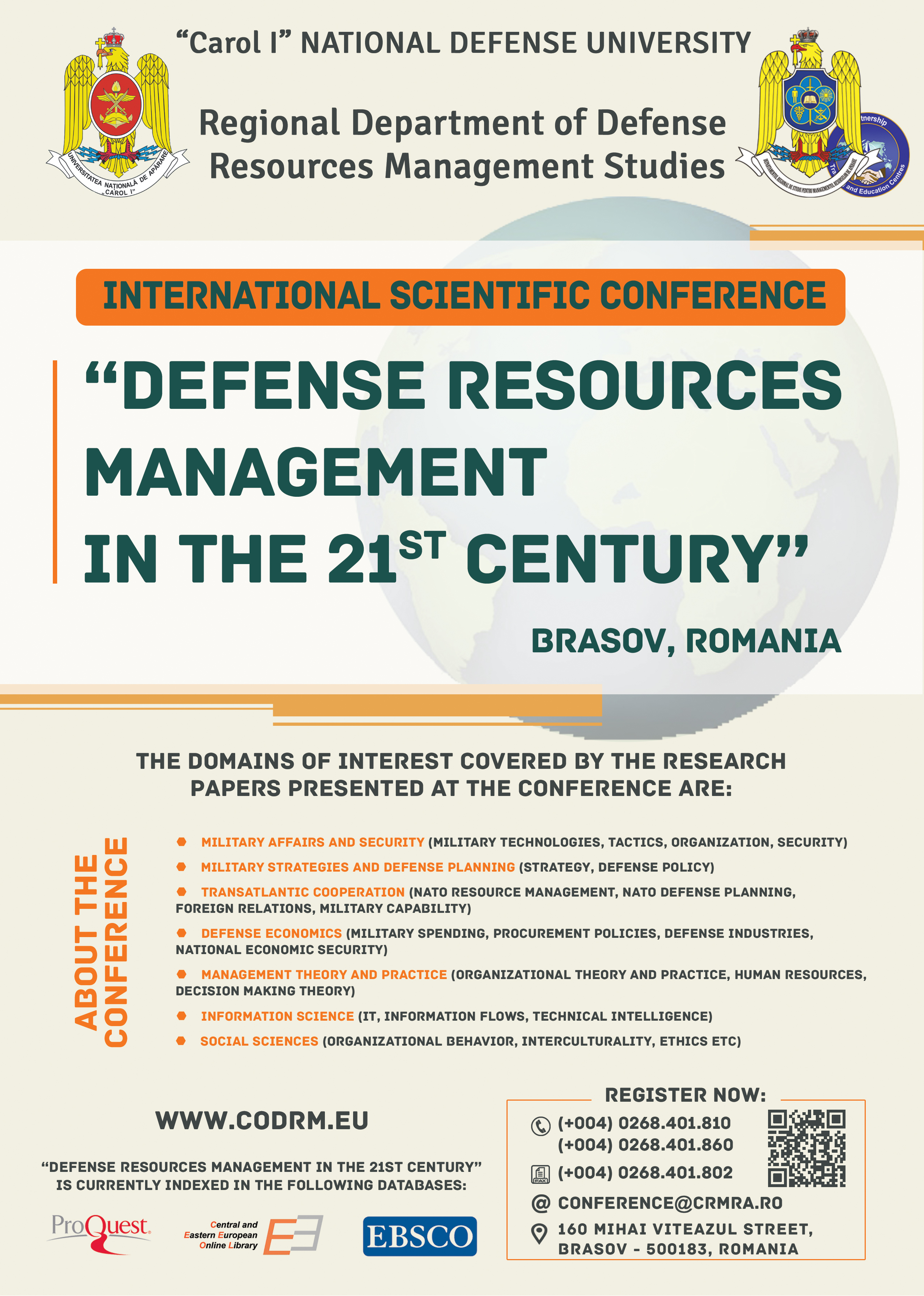
Approximately 80% of world trade currently travels by sea, representing around 93,000 merchant vessels, 1.25 million seafarers, and almost six billion tons of cargo. When appear some disturbing factors, that affect the transfer of goods and the free transit on sea routes for civilian ships involved in trading, disorders of all specific processes are inevitable, starting from the delays to financial losses, lack of confidence and not the least occurrence of critical conditions that can culminate in life lost. About maritime piracy it was written very much, there have been made statistics, but it has not managed so far to put all these documents in a white book of piracy. The data presented in this paper are the results of corroborating statements transmitted by NATO, EU and the organizations involved in analyzing this phenomenon.
More...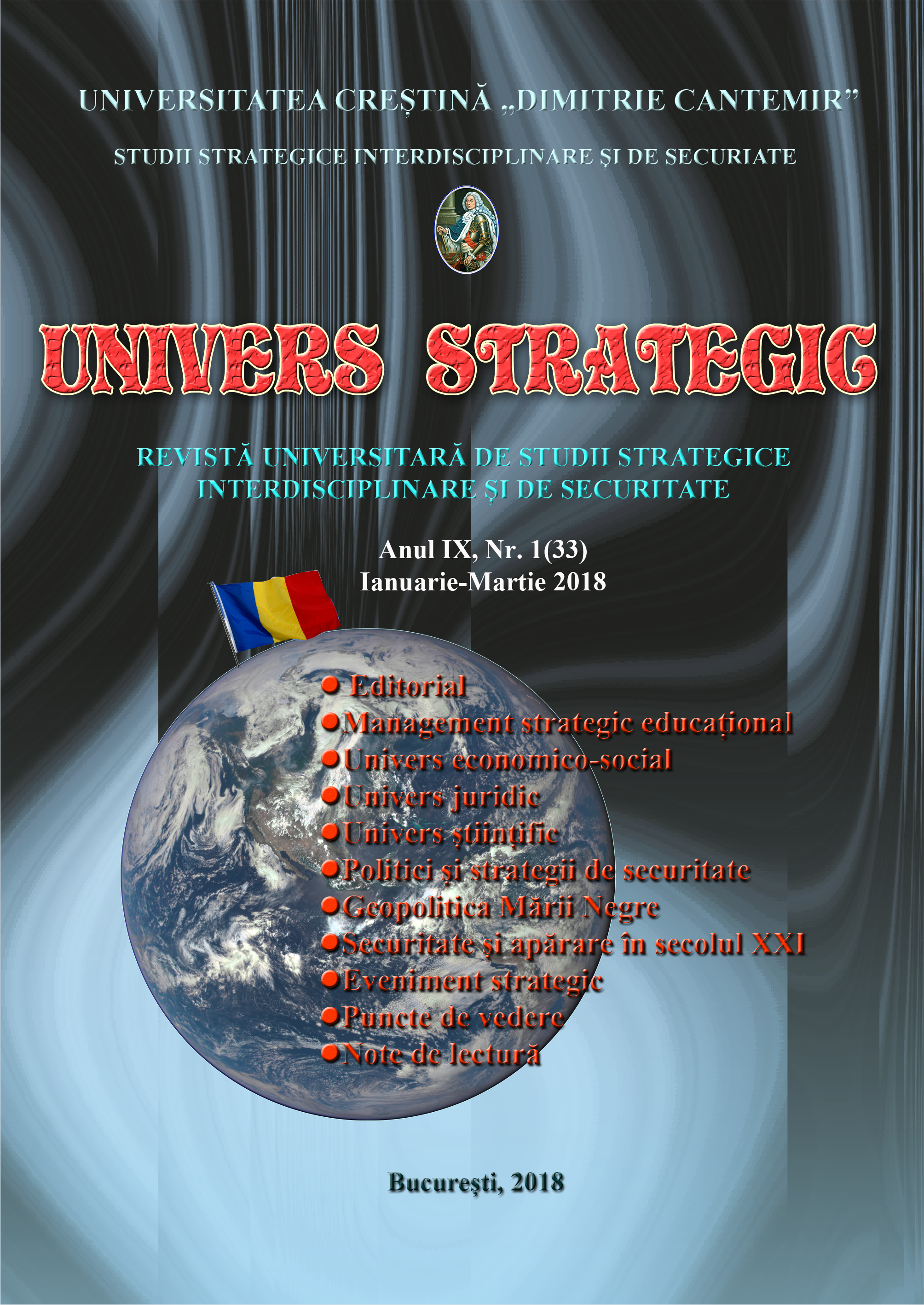
It is widely known that the phenomenon of corruption affects the economies of the world, good social coexistence, the standard of living, the trust of citizens in politicians and public servants, the rule of law and national security.It is obvious that, at present, corruption is a concern for the leaders of the Member States of the European Union. In the following, we will analyze the existing legal framework in Switzerland, a country that is in a neutral position with respect to the other states and which is not member of the European Union, but who are in concrete and effective external relations with decision-makers in Brussels.
More...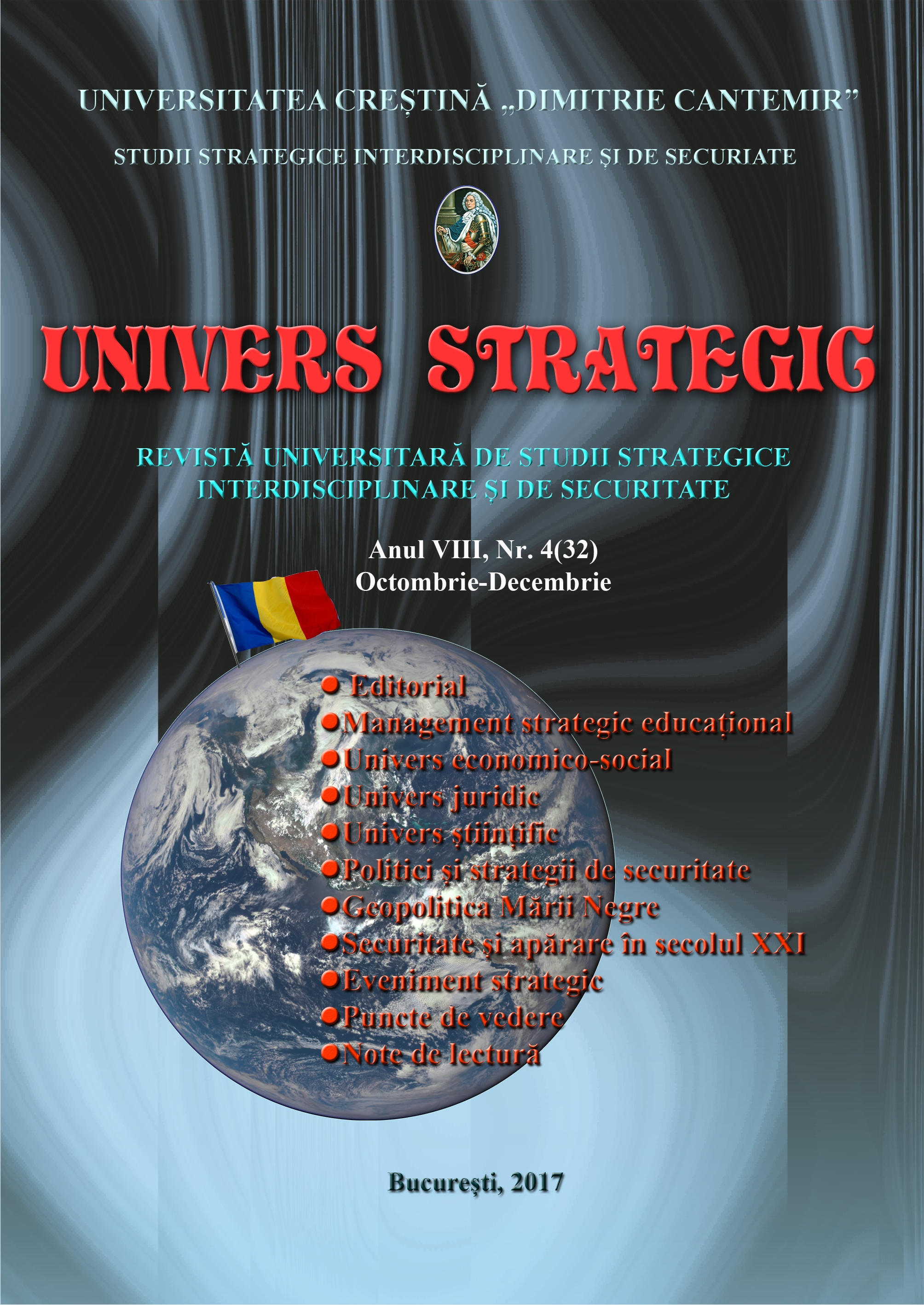
In the Romanian business environment, a situation that is extremely improper for a normal functioning of companies is perpetuated for a very long time, with negative effects including on the state budget. One of the major causes of the abnormal situation is the maintaining of legislative and procedural conditions, favorable to tax evasion through "phantom" companies.
More...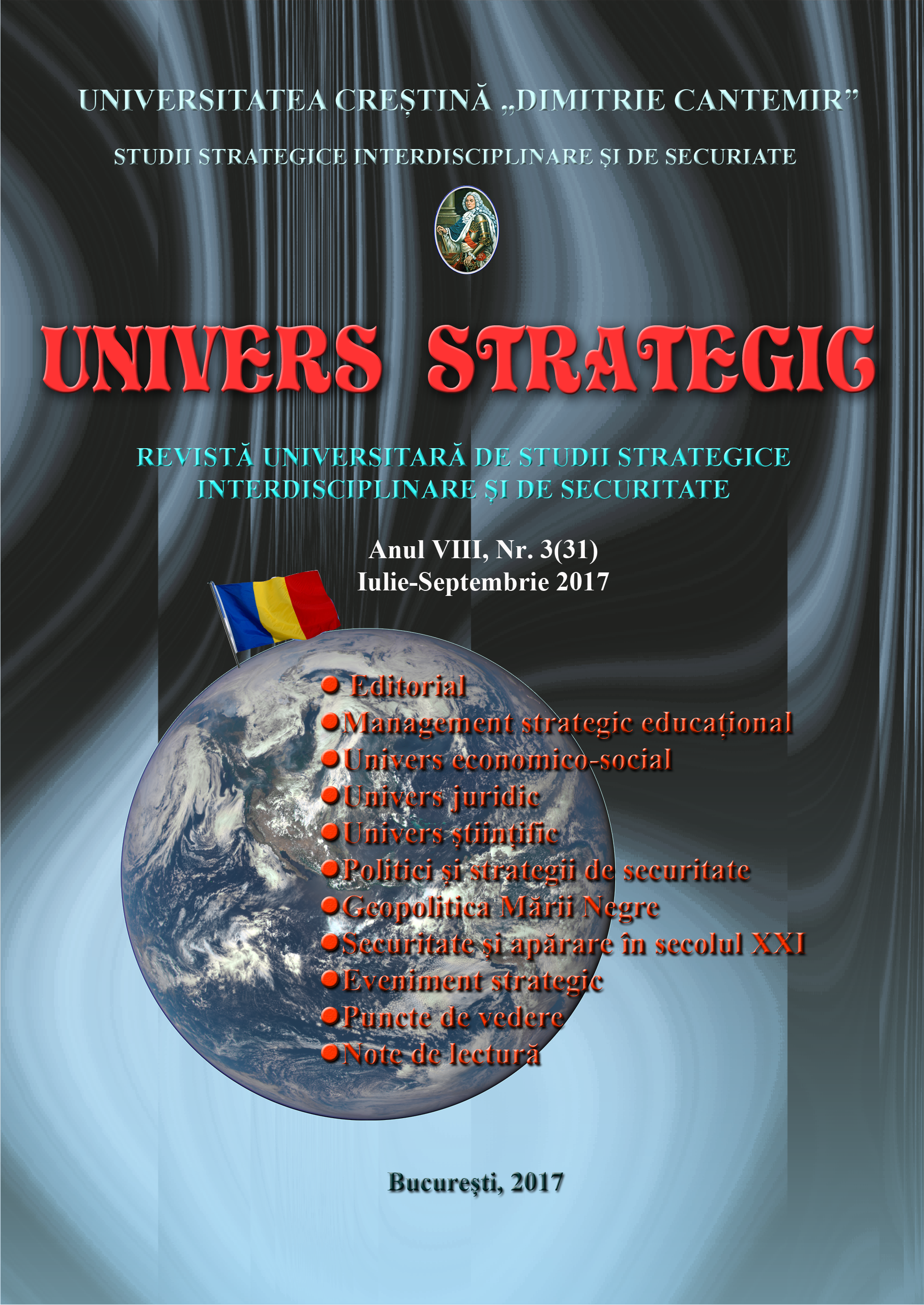
Protection of EU financial interests is a key element of the EU policy agenda for strengthening and increasing the confidence of citizens and ensuring that their money is being used properly. The Lisbon Treaty has strengthened substantially instruments to protect the financial interests of the Union, forcing both the Union and the Member States to combat all forms of illegal activity affecting the financial interests of the European Union. It should also be monitored and controlled activity European Anti-Fraud Office (OLAF) and supported when appropriate, should be combated fraud and irregularities in implementing the EU budget introduced measures to prevent them and to prosecute and reinforced strict protection the Union's financial interests, leaning European prosecutor's actions in this area.
More...
The purpose of this paper is to analyze the importance of open public administration and several aspects referring to transparency as a crucial principle of administrative procedure and administrative law as well as how transparency and accountability impact the value of democracy, citizens’ trust and rule of law. Transparency is a fundamental requirement for the reliability and integrity of public institutions in order to promote public trust and public support. Transparency in public administration guarantees legal assurance and increases the level of legitimacy in decision making process. The principle of transparency has a direct impact on the accountability of administration toward the citizens, while citizens are able to get all the information regarding the work of public administration and also are allowed to get involved in the process of decision-making. The transparency in public administration has a great impact in the process of public administration reform and promotes the level of efficiency, effectiveness and responsiveness, as main components of the concept of good administration.
More...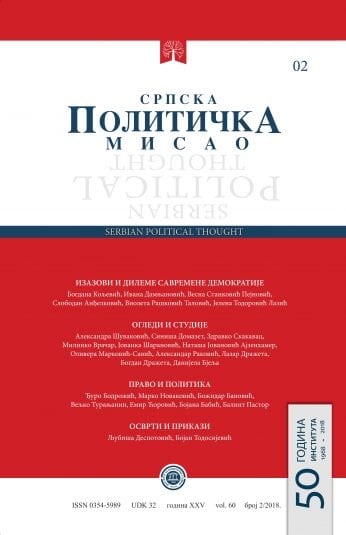
This paper presents and analyses typologies of corruption, from the earliest ones from late 1960-ies until the most recent ones, with examples. Based on them, a typology of corruption in Serbia is offered, i.e. of corruptive experiences on the basis of corruptive acts in Serbia. Three types of corruption are identified in Serbia: parochial, institutional and political. Each of the three types can further be divided into small and large corruption. This paper aims to identify types of corruption on the basis of kinds of corruptive acts that occur and spread within society. Typologies are a powerful analytical tool, not only for research of corruption, but also for practical measures within anticorruption strategies and action plans. Typologies of corruption are useful for systematising corruptive acts, as well as of the ways and levels in which corruption occurs. Upon this insight, the primary types from which to initiate the fight against this dangerous phenomenon can be identified. This paper uses the methods of content analysis and comparation. Its conclusion emphasises that it is most important to suppress political corruption, which simultaneously suppresses large corruption and offers chances for developing the mechanisms for suppressing small (petty) corruption.
More...
The article discusses corruption, anticorruption and democracy in the Western Balkans, with an emphasis on FYR Macedonia, Montenegro and (less so) Serbia. The article does not advance a claim that its conclusions are valid for all West Balkan democracies. The main question is the following: what the political functions of corruption are (beyond its economic functions) and how corruption serves in reproducing the same elites in power. The research presented in the article shows that high-level or grand political corruption in FYR Macedonia, Montenegro and Serbia, is something larger than a side-benefit of exercising government authority. Such corruption is one of the several means which an elite purposefully uses to stay in power, that was originally attained by winning democratic elections. Furthermore, anticorruption mechanisms are often used with a sole purpose to discredit political opponents, especially those in the opposition. Democracy in the Western Balkans is, thus, distorted in obvious, but also in less obvious ways.
More...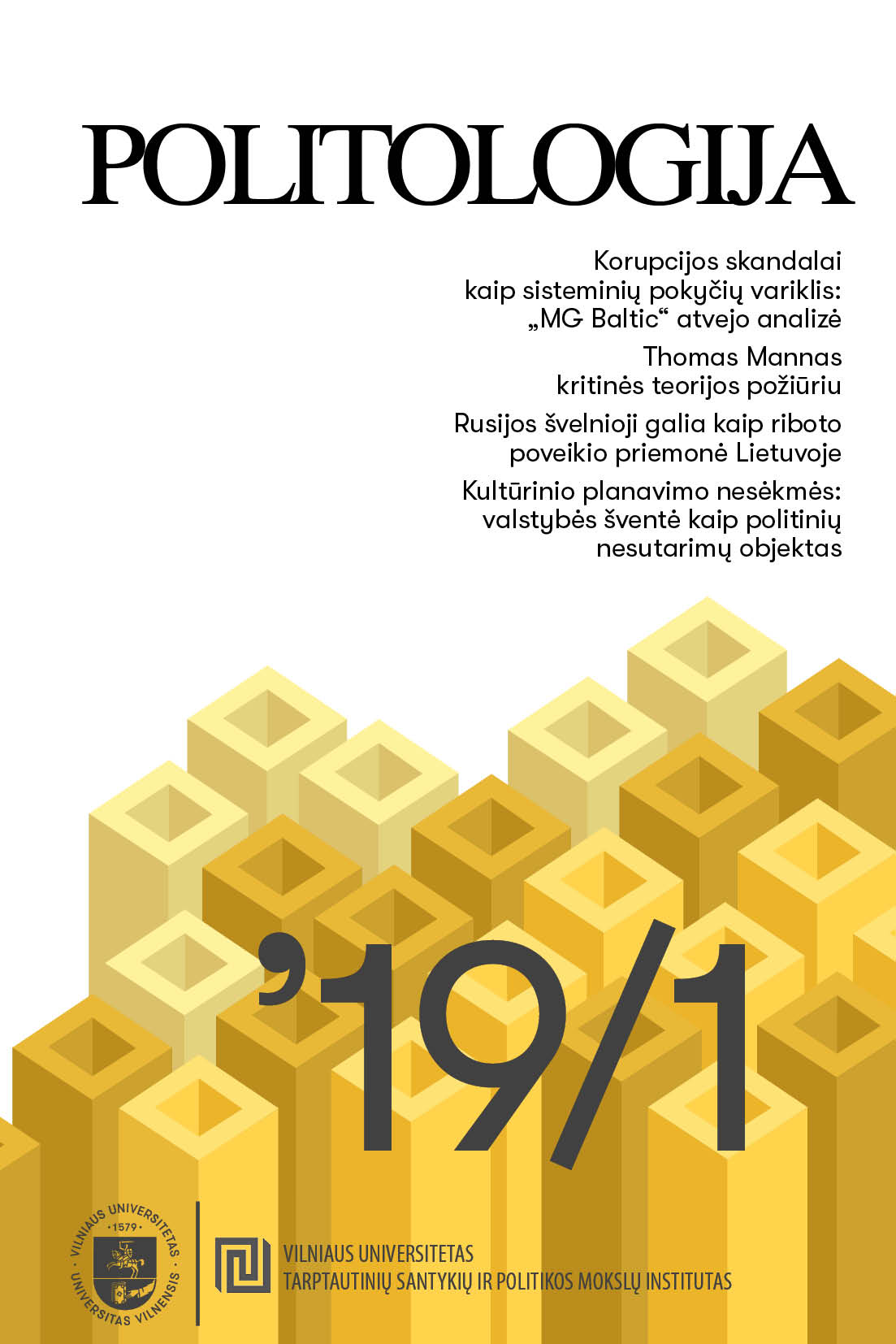
This article aims to determine the impact of corruption scandals on systemic partisan and legislative changes. The study is based on one case analysis focusing on the MG Baltic corruption scandal, which can be distinguished from other corruption scandals by its systemic large-scale trade of and the impact on political processes in Lithuania. The study uses the triangulation method using both official sources of information and 15 anonymous interviews that helped measure changes in informal politics-business relations in the context of the MG Baltic scandal. The changes are analyzed on three levels: changes in legislation, prevention of corruption within parties, and changes in informal political routines. The analysis confirms the significance of the three variables examined in the study – public discontent, media attention and political leadership – for the implementation of anti-corruption reforms.
More...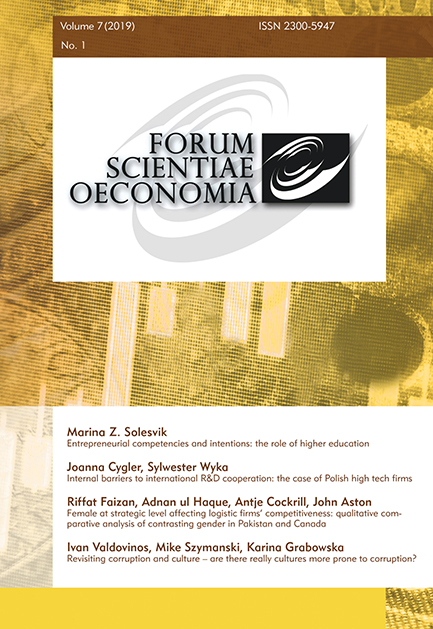
Corruption, i.e. an abuse of power by a person in a position of authority in exchange for personal benefits, is a major challenge in international business. It increases the cost of doing business and discourages foreign direct investment (Cuervo-Cazurra, 2006). Due to its importance to international business, corruption has been the subject of numerous theoretical and empirical studies which aim to ascertain its antecedents and predictors. National culture (or certain dimensions thereof, in particular) has been found to be a strong predictor of high corruption levels. In this study, we revisit Husted’s (1999) and Seleim and Bontis (2009) seminal articles on the relationship between the dimensions of national culture and the perception of corruption. We retest their hypotheses using newly available measures of culture (the GLOBE Project) and a larger data set (1120 country-year observations) and go on to develop and test a follow-up hypothesis about the role of future orientation as an important predictor of the level of corruption. We juxta- pose our results to the original ones and other key studies in the literature on corruption and culture.
More...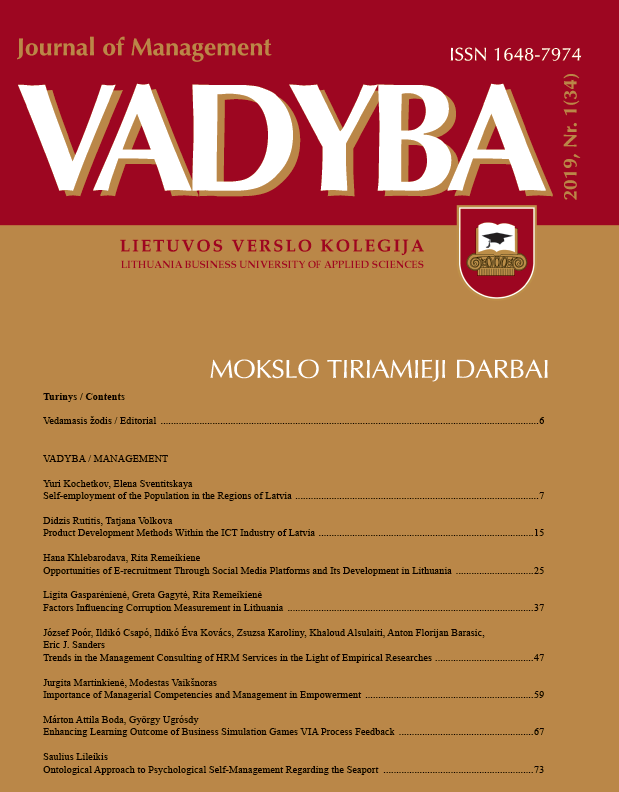
Corruption is one of the oldest human problems that poses a serious threat to the process of economic growth. Corruption in recent decades has been highlighted in many studies. Some corruption studies were focused on the decline of economic indicators, other studies have shown that corruption can increase economic efficiency. Later studies were performed using statistical analysis. The purpose of this article is to assess the level of corruption in Lithuania, identifying the main factors of the emergence of the shadow economy. Having analysed the level of corruption in Lithuania, it was found that in Lithuania between 1999 and 2016, the corruption perception index reached an average of 4.96 points, therefore, it can be argued that Lithuania faces large corruption problems and is not able to bring down corruption.
More...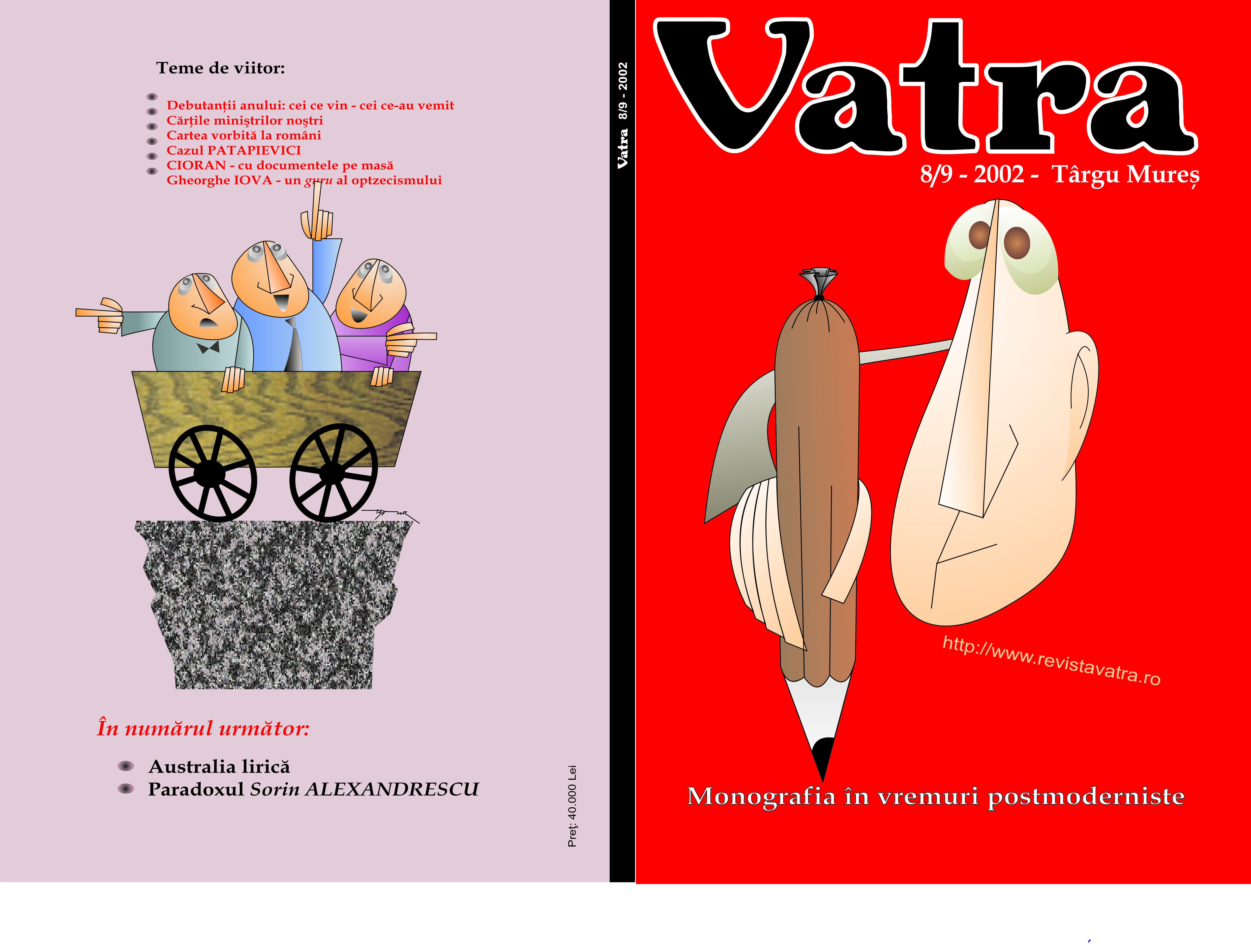
Grand corruption remains a devastating challenge in most part of the sub-Saharan Africa rendering developmental efforts continually negligible. Part of the explanations for this have been the domestic challenges of dysfunctional anti-corruption and legal institutions, most especially, the inability of these institutions to prosecute perpetrators effectually by allowing their trials to linger on. This paper examines some grounds on which the formation of International Anti-corruption Court (IACC) could be based to prosecute the past and future perpetrators. It submitted that given the global dimension of corrupt acts and the inability of sub-Saharan African countries to effectively tame this menace, beyond the criminalisation of corruption or regarding it as human rights issue by various international and regional legal instruments, the establishment of International Anti-corruption Court will intensify and make anti-corruption drive in sub-Saharan African countries more effective. The methodology adopted for the paper is qualitative and the gathered data from the secondary sources were subjected to content analysis.
More...
The appearance and improvement of the internal audit activity in the public and private entities from Romania represented and constitutes a natural necessity, a consequence of the tendencies and practices manifested on international and European level in this field. Our country has taken actions for the implementation of the internal audit service in state and private entities with a certain delay and sinusoidal evolutions, determined by the alternation of administrations and regimes (interwar democracies ‒ communist totalitarian ‒ democratic).The Ministry of National Defence as part of the public administration, through specialized structures and in all its composing entities, applies the provisions of normative acts regarding the development of internal audit activity, fact for which we highlighted reference moments in the process of occurrence, organization and exercise of audit activity internal public in the structures of this ministry
More...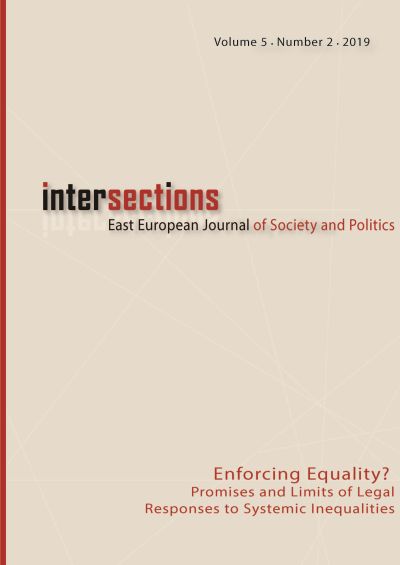
Offering a decent database easily applicable to cross-country comparison, Transparency International’s Corruption Perceptions Index (CPI) has been widely used as a variable for showing the level of corruption. However, surveys of its sources are based on presumptions which mainly apply to bottom-up forms of corruption, namely free market corruption and bottom-up state capture, and therefore it is insufficient for assessing the state of a country plagued by top-down types of the former. We provide an analytical framework that distinguishes four levels of corruption and draws on the experience of the post-communist region. Using this framework to analyze the CPI’s survey questions, we explain why the index provides a blurred picture of the region. ‘Big data’ evidence for top-down corruption in Hungary is also presented, signifying the need for a more refined index.
More...
The aim of this study is to examine the relationship between political corruption, income inequality and poverty between 2000 and 2019 in Nigeria. The study utilized secondary data from World Bank Development Indicators, Transparency International and the National Bureau of Statistics in Nigeria, and fully modified ordinary least square and Granger causality were employed to address the objective of the study. Consequently, the findings that emerged in this work could be enunciated thus; political corruption and income inequality have a significant negative relationship. However, corruption and poverty head count have an insignificant direct relationship. In the same vein, corruption and exchange rate have a significant positive relationship. In addition, there is a unidirectional causality which runs from political corruption to income inequality. Similarly, political corruption Granger causes exchange rate. Also, there is one-way feedback relationship flowing from exchange rate to inflation rate. However, no feedback relationship exists between political corruption and income inequality in one hand, and political corruption and exchange rate on the other hand. In a nutshell, it could be concluded that political corruption is responsible for the rise in poverty level in Nigeria, Also, political corruption Granger causes income inequality in Nigeria. Against this backdrop, the study makes the following recommendations to the policy makers in Nigeria that any time the goal of the policy makers is to reduce poverty and inequality of income among the Nigerians, policy that will address political corruption should be of the priority. In the same line, ant graft institutions such as EFCC and ICPC should be strengthened in order to achieve their primary goals of curbing corruption in Nigeria.
More...